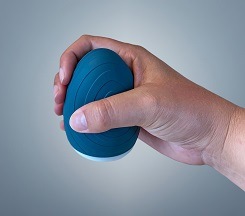
MindMaze has announced the US and EU launch of Izar, which it describes as a “first-of-its-kind”, US Food and Drug Administration (FDA)-listed and CE-marked smart peripheral for patients with impairment in hand motor function.
Izar is designed to fill a “critical gap in neurological care today”, according to a MindMaze press release, and aims to be the most effective hand dexterity and strength treatment in a wide range of neurological conditions. This proprietary peripheral is part of a comprehensive, omni-site approach to the treatment and maintenance of neurological diseases, including stroke, Parkinson’s disease, Alzheimer’s disease, and traumatic brain injury (TBI), among others.
The newly launched device allows clinics to “finally address the unmet or underserved need of hand recovery” through new in-clinic or remotely supervised self-training programmes at home, which is intended to increase the dose and quality of training.
Izar is a hyper-sensitive controller built from the ground-up to train and assess both dexterity and strength, through capture of the fine grasp forces and wrist movements required to carry out activities of daily living. It can detect sub-newton-level patient finger and hand forces, enabling treatment in the most impaired patient populations, the release adds.
The “simple and highly portable” controller is accompanied by proprietary and engaging gaming content that allows patients to self-train, either in-clinic, at bedside, or in the comfort of their home, “dramatically enhancing and expanding training opportunities”, according to MindMaze.
“It is very exciting to have a device for the hand that has the versatility of Izar,” said John Krakauer (Johns Hopkins University, Baltimore, USA), MindMaze’s chief medical director. “It can serve as a controller during reach-to-grasp movements, as a trainer of grip force gradation, and as an assessor of dexterity. The device is also highly portable, so it can be used across the continuum of care, which is important, as the upper limb, and the hand in particular, gets relatively neglected in neurorehabilitation.”
Global centres like the Shirley Ryan AbilityLab in Chicago, USA, University College London in London, UK, and the University of Auckland in Auckland, New Zealand, are already actively using Izar in pioneering clinical research, MindMaze also states. Izar was subjected to rigorous prelaunch testing across nine sites and delivered more than 250 hours of active supervised and self-training therapy time in 250 patients, receiving unanimously positive feedback.
Izar is available today in the USA as well as European countries including France, Switzerland and Germany, with content that enables training of dexterous grasp, pinch, and grip. Future software content will unlock training content for wrist, bilateral movements, combination movements of the upper limb and hand, as well as dexterity assessments for hand and wrist, according to the release.










